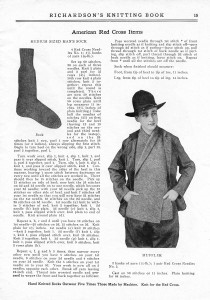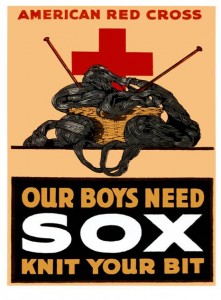American Red Cross and Knit Your Bit
World War I knitting campaign poster
Knit Your Bit was synonymous with the volunteer Red Cross knitting programs for the military and civilians during World War I and again in World War II. At the outset of World War I, Major Grayson M.P. Murphy, Red Cross commissioner to France, and the other U.S Army officers made an urgent appeal encouraging the homefront to knit mufflers, socks and wristlets for our soldiers and sailors.
In an article from the October 1917 Red Cross Magazine, Major Murphy asked the Red Cross to start shipping at once, stating they would need half million each of knitted mufflers, sweaters, socks and wristlets citing the value for military and civilian work in light of expected fuel shortages and other discomforts during the winter months. These voluntary knitters belonged to the Red Cross Production Corps. Military knitting patterns designed to be compatible with soldiers’ and sailors’ uniforms were required to be knitted in olive drab or navy blue. There were also patterns designed for convalescing soldiers, such as the “Walking Cast Toe Sock,” the “Cap for the Bandaged Head” and the “Man’s Coat Sweater.”
 The Red Cross provided quality control for each piece, returning items that were poorly made or did not meet the required specifications. Labels were sewn into the garments that read “Gift of the American People through the American Red Cross.”
The Red Cross provided quality control for each piece, returning items that were poorly made or did not meet the required specifications. Labels were sewn into the garments that read “Gift of the American People through the American Red Cross.”
The knitting program’s influence even extended to the White House where President Woodrow Wilson allowed sheep to graze on the White House lawn. When the sheep were sheered, the wool was auctioned off and the proceeds went to the American Red Cross war relief fund. With the onset of World War II, the call went out again for knitted articles for service members. Almost over night, the Red Cross appropriated the massive quantities of wool needed for the task.
To learn more about the American Red Cross schedule a tour of the historic National Headquarters building in Washington DC go to http://www.redcross.org/about-us/history/explore-our-history

